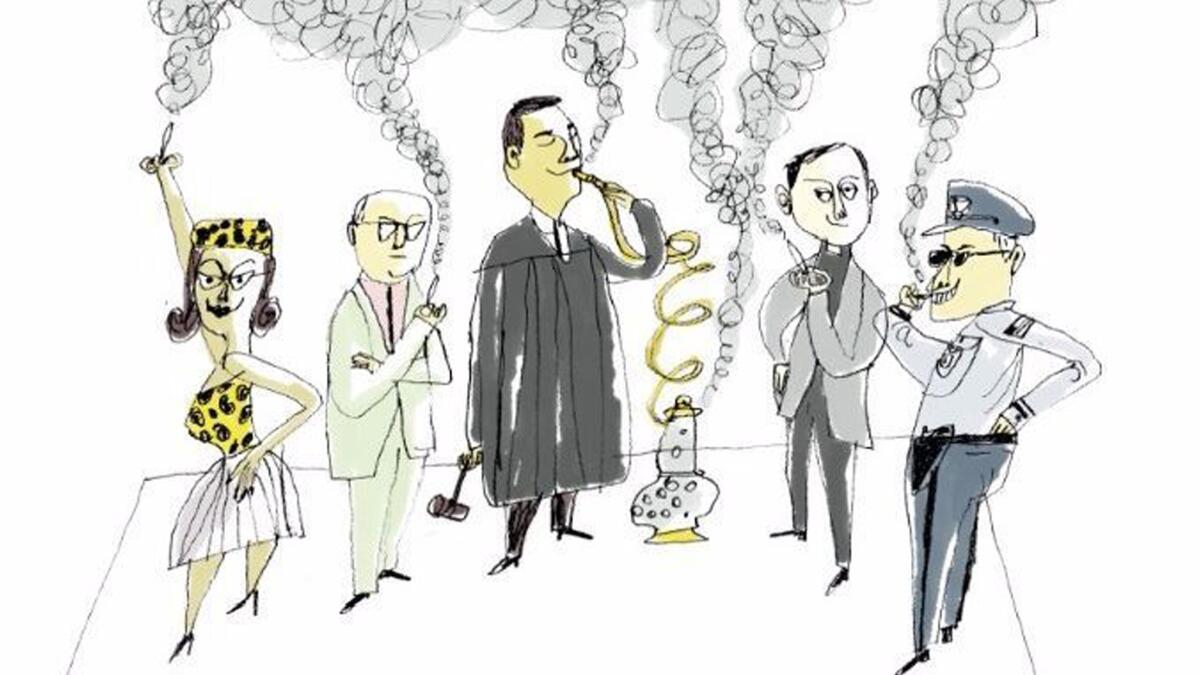Op-Ed: Legal weed? Bummer, man

“We fought for the right to party. And we won! And now it turns out that partying was more fun when we had to fight for it.”
Quietly, and obfuscated by the stunning stupidity of our electing Donald Trump president, the recreational use of marijuana became legal in four more states this month. That’s eight in total now, plus Washington, D.C., with another 20 states (including Arkansas and North Dakota) having taken the initial step of legalizing medical usage. So if my math serves, that makes what? … 34?… no, wait… 28 states that have changed their laws. More than half of America’s nifty 50. It seems pretty clear we’re headed toward a future of legal pot smoking.
“I think it’s the beginning of the end of the war on marijuana in the United States,” said California Lt. Gov. Gavin Newsom, who pushed for Proposition 64 in the Golden State. This is very good news for lots of reasons, high among them being the role marijuana arrests play in our country’s shamefully high rate of incarceration, and the proven disparity between arrest rates for black and white users.
We will miss illegal pot. At least some of us will.
But with any gain comes a little loss. We will miss illegal pot. At least some of us will.
I came of age under the tyranny of Nancy Reagan’s “Just Say No” campaign in the 1980s, when we had made-for-TV movies like “Desperate Lives” scaring us straight (Helen Hunt jumps out the window, the closed window, of a second-story high-school science lab screaming “I’m invincible!”). Double-agent rock stars like Huey Lewis fed us propaganda like “It’s Hip to Be Square.” My generation had to learn about the pleasant, generally harmless effects of marijuana by hook or by crook. We had to be, literally, outlaws.
Which was exactly what we wanted to be as teenagers. A pretty natural desire, I think, for developmental reasons. Adolescence was all about defining ourselves through defiance of our parents, honing our independence on disobedience and insubordination. Our parents knew this, of course, even if we didn’t know that they knew it.
When I was 15, soon after I’d started smoking pot, my father brought me into his office for a talk. He told me that he did not want me to smoke pot, but if I was thinking of trying it, I should do it at home. With him there. “If you’re going to experiment,” he said. “I want you to do it here, under my roof, so I can make sure you’re being safe.” He even offered to get weed for me.
This blew my mind. Was this a Trojan horse? A way to get me to ’fess up before I even got caught? And where would my dad buy pot? I imagined him meeting Ray, the senior at my high school who sold me and my friends a bag after getting us stoned for the first time at a party. Ray wore a black leather jacket. My dad wore Rockports. I couldn’t picture the two of them in the same room. (My dad had smoked pot in the ’60s, of course; plenty of his friends still smoked. I had no idea.)
“That would be the last thing I would ever want to do in my entire life,” I told him, truthfully.
Just his offer to buy pot for me made my new hobby less fun. How was I supposed to feel like I was sticking it to The Man if The Man in my own house refused to act like The Man? I tried to put it out of my mind.
There was an element of romance, in the old, swashbuckling sense of the word, that went with smoking pot when it was taboo. (And creative genius, too. You should have seen the smoke-exhaust system my friend James rigged up with paper-towel rolls and cotton-ball filters.)
Like Judas Priest, robbing banks with their electric guitars in the “Breaking the Law” music video, we were getting one over on authority. Pot-smokers were a secret society, outcast rebels, thumbing our noses at polite society. “We are not old men,” said the Rolling Stones’ Keith Richards, to a courtroom full of white-wigged barristers after an infamous 1967 drug bust at his estate, Redlands. “We are not worried about petty morals.” If you want to be a rock star, even if you’re just a stupid, pampered kid in the New Jersey suburbs posing like a rock star in front of your bathroom mirror, you need rules so that you can break them. Pot being illegal makes for perfect early practice.
I worry about the kids in the future. How are they supposed to feel like rock stars? How are they going to rehearse rebellion — which seems (forgive me for harshing your mellow) awfully important what with our newly elected president and all. God forbid a future where all our disaffected youth are just happily, legally stoned all the time, too sated to get up off the couch and go shout at cops in the street. God forbid pot replaces religion as the opiate of the masses, like Aldous Huxley imagined it, as “soma” in “Brave New World.”
Who would’ve guessed we’d end up in this situation? We fought for the right to party. And we won! And now it turns out that partying was more fun when we had to fight for it.
It’s a bummer, man.
Dave Bry is the author of a memoir, “Public Apology.”
Follow the Opinion section on Twitter @latimesopinionand Facebook
More to Read
A cure for the common opinion
Get thought-provoking perspectives with our weekly newsletter.
You may occasionally receive promotional content from the Los Angeles Times.






